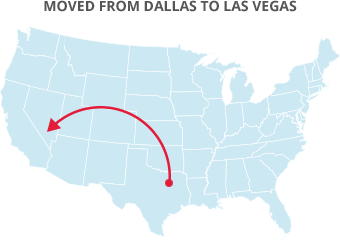

 By Julie DeLong, A-1 Freeman Moving Group
By Julie DeLong, A-1 Freeman Moving Group
1. Visit your new town. Before deciding to move anywhere, it’s always a good idea to go to your new town. Sure, you can hit all the attractions, but don’t just visit as a tourist. Drive through neighborhoods. Notice where grocery stores, gas stations and schools are located. Think about your life and how it would transfer to this new location.
2. Research schools. When you are visiting your new town, pinpoint the schools that your children will be attending. Look at the surrounding neighborhoods and also do some online research to see how the public schools rank and what private school options are available in the area.
3. Make a moving budget. Let’s face it, moving isn’t cheap. Even DIY options come with a hefty price tag. And, if you are moving a long distance, a professional mover will definitely make the job less stressful. Don’t forget to include some extra for unexpected expenses, as they often seem to arise. If you are moving for a job, check with your employer to see if any of your moving expenses can be covered.
4. Find a place to live. If you have kids and have researched what school you would like them to go to, your choices of a neighborhood in which to live have likely been narrowed down some. But, regardless, a realtor can guide you through the house hunting process. A knowledgeable real estate agent will show you homes in your choice area and be able to answer all of your questions about the neighborhoods.
5. Research moving companies. Hiring a reputable professional mover is vital for your move. Do your research by checking Google reviews and the BBB ratings. Talk to other people who have moved recently and find out what moving company they used. Obtain multiple quotes from different movers to compare. Ask questions if you don’t understand something on the quote and make sure you are comparing apples-to-apples. Remember, if a quote seems too good to be true, this can be a red flag.
6. Choose a moving date. If you are planning to move in the middle of the summer, you will want to get with your moving company to confirm your preferred dates as far in advance as possible. Summertime is considered peak season for moving, so dates fill up quickly. On the other hand, if you are wanting to move during the winter or early spring, you will probably have your choice of dates and may even end up spending a little less. You will frequently pay a premium for moving during peak season.
7. Start collecting your moving supplies. By collecting boxes now, you can be a small step ahead when it comes time to pack. You can also buy boxes from your local moving company or from most big box stores. Don’t forget other moving supplies, such as tape, bubble wrap, newsprint, box knife, etc.
8. Have a plan for packing. Before you actually do any packing, come up with your plan. It is a good idea to go through your belongings beforehand and decide what you are going to take with you and what you don’t need any longer. Have a garage sale or donate to a charity the items you don’t need to move. Then, you can start packing non-essential items such as basement and attic items and also out-of-season items. After that, move on to things that you won’t need for the next few weeks. Wait until the days leading up to moving day to pack items that you use regularly. Make sure and ask your moving company if there are items that they can’t transport in the moving van, such as live plants, flammable items and perishable food. You will need to make alternate arrangements for these items.
9. Pack your suitcases, as well. If you are going to be on the road for a couple of days in route to your new home, you will need clothes and toiletries for the journey. Make sure and set aside everything that you will need along the way so that those items don’t accidently get packed up and loaded on the moving van.
10. Make travel arrangements. If you are driving to your new home, plan your route and book your hotel rooms in advance. Likewise, if you are flying, select your airline and buy your tickets. Remember that you might need to stay in a hotel for a few days in your new city if your belongings won’t be delivered right away.
11. Transfer memberships and records. If you have a gym or golf club membership, look into transferring them to your new city. Also, ask your child’s school to send their records to the new school and likewise for your doctors and dentist.
12. Empty your storage unit. You might as well go ahead and sort through your storage unit, too, and get rid of anything that you don’t need. Beyond that, make sure and notify the management of the unit that you will be moving your things out and contact them again once you have vacated the space.
13. Forward your mail. These days, it is simple to forward your snail mail to your new address. Just go on to the USPS website and fill out the necessary information. This is a super simple step, but it’s often overlooked, so we wanted to mention it.
14. Confirm your moving date with your mover. You will likely hear from your moving company several days or a week before your move date, but if you haven’t, now would be a good time to go ahead and reach out to them and make sure that your move dates still match what they have on their schedule for you. Last minute schedule changes are never fun for anyone, so it’s always in your best interest to double check all of the details to make sure everyone is on the same page.
15. Cut-off and set-up your utilities. The timing of this step is of the utmost importance because you don’t want to be moving out of your old house in the dark or moving into your new house without heat or air conditioning. Contact your current and future utility providers and find out what you need to do in order to ensure a smooth transition.
16. Arrange a move-out cleaning. Once you have everything moved out of your old house, you will likely be too exhausted to want to clean. There are cleaning services that specialize in vacant houses so consider hiring the cleaning done.
17. Let others know your new address. This step could be done after you arrive at your new house, as well. But you will want your friends and family to have your new address. Consider sending out a change of address card or at least an e-mail to let everyone know that you have moved.
18. Exchange contact information with your moving van driver. Once everything has been packed up and the moving van is ready to head out, make sure and ask the driver for the ETA to your new house and for his cell phone number. Also provide him your cell phone number. You want to have a way to keep in contact while everyone is on the road.
19. Schedule a handyman. Make sure and find a reputable handyman once you move to help with tasks such as switching out light fixtures, making simple repairs or hanging items on the walls.
20. Register to vote and get a new driver’s license. Updating your voter registration soon after you move is smart so that you can vote in any upcoming elections. Your local library or post office can usually provide more information on how to register. Also, getting a new license is vital after you have moved to a new state. Check your local DMV website to make sure that you have all of the needed paperwork before you wait in line, as requirements vary from state to state.
A-1 Freeman Moving Group would love to help. Just contact us today to get started with your free in-home or video estimate.
Request a free quote

